May 21, 2012
Making learning come alive
Alumni Association recognizes faculty who excel in teaching
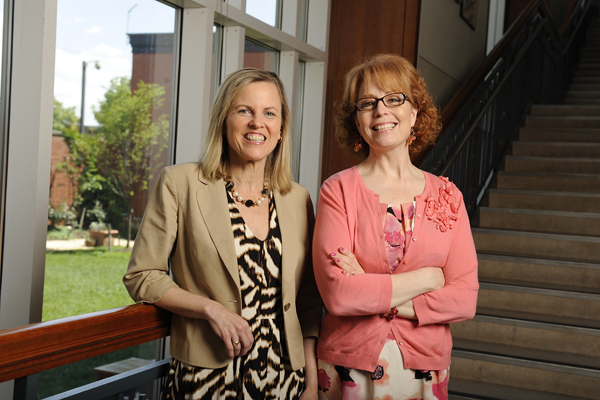
SCHOOL OF NURSING: Assistant professors Martha Sylvia and Laura Taylor are among the 13 faculty members whose classroom skills earned them kudos from students and Excellence in Teaching Awards from the Alumni Association.
Students inherently want to learn and succeed. Great teachers help them achieve these aims. They use passion, humor, dedication and even the occasional puppy or other prop to aid students on their path of discovery.
Good teachers also know how to adapt and, in these attention span–challenged days, keep topics interesting and engaging.
One Johns Hopkins professor finds inspiration in a quote from civil rights activist Howard Thurman. “Don’t ask yourself what the world needs. Ask yourself what makes you come alive, go do it. Because what the world needs are people who have come alive.” This professor wants his students, and the act of learning, to do exactly that—come alive.
Some teachers follow in the footsteps of parents and grandparents, while others travel an indirect route to the profession. What the winners of this year’s Johns Hopkins Alumni Association Excellence in Teaching Awards have in common is that they all love to share knowledge, and all excel at what they do.
The award, which has been given annually since 1992, allows each academic division of the university to publicly recognize the critical importance of teaching. The nomination and selection processes differ by school, but students must be involved in the selection. Some schools give multiple awards in different classifications, such as the School of Public Health, which calls its awards Golden Apples.
This year, The Gazette asked the winners a series of questions so that they could share some insight on what inspires them and makes the process of learning a success.
Bloomberg School of Public Health
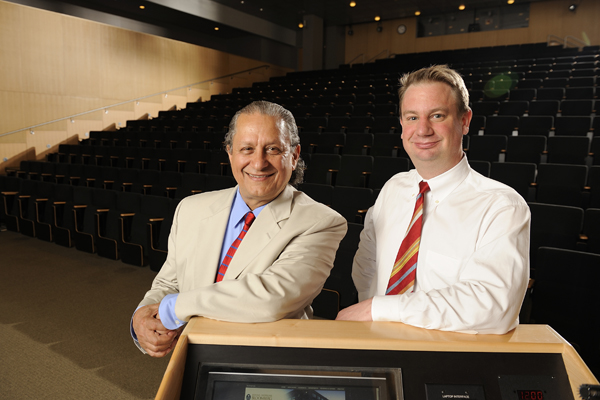
BLOOMBERG SCHOOL OF PUBLIC HEALTH: Homayoon Farzadegan and John McGready
Homayoon Farzadegan, professor, Department of Epidemiology, medium-sized class
How would you describe your teaching philosophy? I believe in accommodating the learning process rather than only teaching. The best learning process is achieved by group discussions as well as structured lectures. I get my students actively involved in the classroom. They have to prepare a PowerPoint presentation for class discussion on the topic of the day.
What’s the best piece of teaching advice you ever received? Be prepared and updated. Each session is as important as other sessions.
Did you have any teaching inspirations? My doctoral adviser, mentor and teacher, Dr. Ivan L. Roth at the University of Georgia.
Best teaching/classroom moment of the past year? The best moments are often the last sessions of all three courses that I teach, in which the course is overviewed. I start with learning objectives of the course and then I ask, Is the mission accomplished?
What have you learned from your students? A lot. Students are very valuable resources for teaching. They share their experiences and expertise in the classroom to complement the lectures and syllabus. A combination of updated lectures, student group presentations and class discussions provide a great learning environment for students and faculty.
John McGready, assistant scientist, Department of Biostatistics, large-sized class
How would you describe your teaching philosophy? Teaching encapsulates a learning experience for both the students and the instructor. Enthusiasm and ongoing curiosity about one’s subject are essential. Student/instructor interaction is critical, regardless of class size and modality.
What’s the best piece of teaching advice you ever received? More generally, the best career advice was along the lines of “do what you love and love what you do.”
Did you have any teaching inspirations? I’ve been inspired by teachers from all walks of life—friends, family, colleagues, etc. Two very strong influences from education include my high school calculus teacher and a high school English teacher. Both showed incredible passion for their respective disciplines, were both knowledgeable and intellectually curious, and made the learning experience interactive and fun.
Best teaching/classroom moment of the past year? There are too many to mention.
What have you learned from your students? Everything. But an incomplete list includes an appreciation for differing learning styles, and a lot about statistics as their questions lead me to new discoveries and insights.
Carey Business School
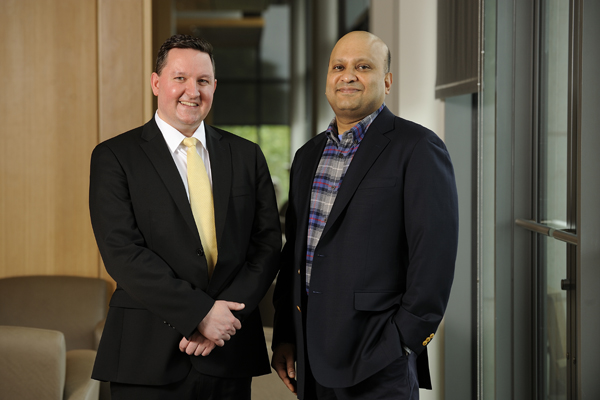
CAREY BUSINESS SCHOOL: Joseph Colantuoni and Ravi Aron
Ravi Aron, assistant professor, research track
How would you describe your teaching philosophy? I believe that a true measure of learning is the extent to which it enables the student to ask penetrating, searching questions. This is often more important than being able to produce accurate and competent answers to questions. Increasingly, what students are called upon to do as managers is not analysis—formulating complex analytical models—but synthesizing multiple ideas and letting resultant insights emerge.
What’s the best piece of teaching advice you ever received? Prepare thoroughly before your class. Organize your ideas and material and present them as simply and directly as you can. Really good teaching is not theater with you at center stage but is a conversation between you and the students. If you find the ideas and concepts that you teach interesting and important, most of your students will, too.
Did you have any teaching inspirations? At NYU’s Stern School of Business, where I did my PhD, I had Dr. Stephen Slade as a tutor. [He] had an amazing gift of being able to coax even the most diffident of students to participate in class and come up with unusual questions. The time that I spent watching him teach in class was perhaps the best learning experience that I had.
Best teaching/classroom moment of the past year? I was teaching a class on how information technology can be used to reduce the incidence of medical errors of several kinds, and why even some extremely sophisticated IT systems fail to deliver benefits. One of the students stopped me in my tracks and said, “Professor, I think you will not be able to reveal further insights in this space.” When I asked him why, he said, “Your data will reveal what factors were considered and how the decisions were made. What we need instead is an anthropologist, a fly on the wall, to observe those physicians and managers in their meetings and ask what questions did they not ask, and why.”
What have you learned from your students? On many days there will be a student or two in my class who may know more than I do about some topic that I teach. This is not a threat; it is an opportunity, for both the rest of the class and me.
Joseph Colantuoni, senior professional instructor
How would you describe your teaching philosophy? I hope to take the complex world of banking and finance, simplify it and make it useful and accessible to every student. As an economist for the FDIC, I have analyzed the widespread effects of the recent financial crisis and know the importance of making sound financial decisions in the face of uncertainty. However, the field has become so overwhelmingly quantitative that it takes an extra level of experience and determination to teach it successfully. My practical work experience informs the classes I teach and helps me turn complex ideas into simple lessons.
What’s the best piece of teaching advice you ever received? Nothing really special, just be prepared and always stay relevant. Class may only be a few hours long each week, but the time and effort required to prepare a quality lecture is much longer.
Did you have any teaching inspirations? Many of the mathematics and economics professors I had at Bowdoin College displayed a passion for teaching that I will never forget. This small liberal arts college in Maine unites a select group of students with professors focused on undergraduate education. The professors instilled a love of learning, intellectual curiosity and level of enthusiasm that I strive to pass on to my students. This dedication to teaching has provided me with inspiration and guidance for my entire career.
Best teaching/classroom moment of the past year? When a certain well-known social media company released its financials for the first time just before my class on initial public offerings, I wondered if there was some sort of divine intervention in my syllabus. I’ve never seen students so interested in the financials of a company before. The timing of this real-world case study and the class discussion surrounding it was perfect.
What have you learned from your students? After class has ended, I have found myself in discussions ranging from Taiwanese teenagers trading futures on their cell phones to unique aspects of Islamic banking law or microfinance in Peru. These discussions remind me how financial issues affect the daily lives of people around the world and the importance of financial education. I may be teaching finance in a classroom at a distinguished American university, but the globally diverse students at Carey are always teaching me something new about financial markets in their own parts of the world.
Krieger School of Arts and Sciences
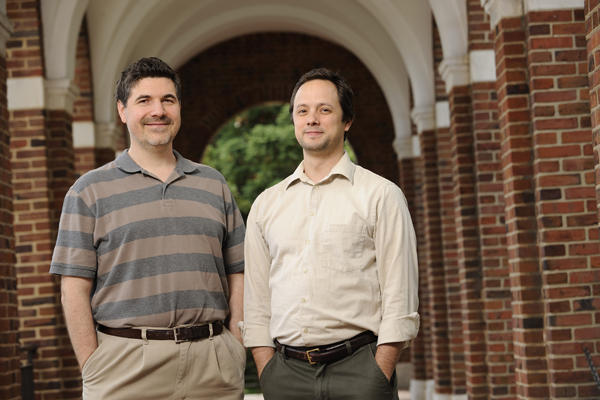
KRIEGER SCHOOL OF ARTS AND SCIENCES: Petar Maksimovic and Justin Halberda
Petar Maksimovic, professor, Department of Physics and Astronomy
How would you describe your teaching philosophy? I am a believer in “active learning” in a sense that the students need to actively participate. There are many ways to accomplish this, but I personally try to fit as much problem solving in lectures as I can. Thankfully, physics lends itself to problems that are both fun and educational.
What’s the best piece of teaching advice you ever received? That the best person to explain a concept is one who just understood it. I heard this in a talk by Eric Mazur [at Harvard] in 1997. But it took me 15 years to truly buy this idea.
Did you have any teaching inspirations? In high school and college, I had several talented teachers. However, these days my biggest inspiration is my students.
Best teaching/classroom moment of the past year? In the Electricity and Magnetism course for physics majors, we spent the whole class solving progressively harder problems. I use clickers even in a class of 20 students, and in the last question, I managed to split the class in half and then let them explain the answer to each other. By the end it was clear to me that they understood the whole unit completely. This was also the most fun class for both the students and myself.
What have you learned from your students? To not be afraid of trying new things in class. To own up to my mistakes—caused by trying new things. To be flexible. To be understanding. And, above all, to be generous with my time with them. On campus, the students are my highest priority.
Justin Halberda, associate professor, Department of Psychological and Brain Sciences
How would you describe your teaching philosophy? Share your passion. Each day on my way to lecture I try to ask myself, What is at least one amazing thing that I will tell them about today?
What’s the best piece of teaching advice you ever received? My father-in-law, who has won teaching awards at Cornell University for his course in biochemistry, once said that the activity of teaching—of sharing information from one mind to another—is a spiritual event. It is holy work. It is the one thing that we humans share that no other animals seem to excel at. And so, when we teach, we are putting our hearts into something that is incredibly rare on this earth, and in that way spiritual.
Did you have any teaching inspirations? The most powerful events in my education occurred when a teacher communicated to me that they saw something in me, some potential. Those moments carried me through.
What have you learned from your students? My students are often my inspiration. They work very hard and are eager to learn more, and they blossom through the exchange of ideas and engagement in the material. That feeds me and inspires me to continue putting in the effort to improve everything I’m doing.
Peabody
Gary Thomas, chair of Jazz Studies
Gary Thomas was unavailable for this story.
SAIS
SAIS gives its Excellence in Teaching Award to a faculty member at the Bologna Center and announces it at the center’s commencement, which will be held this year on May 26.
School of Education
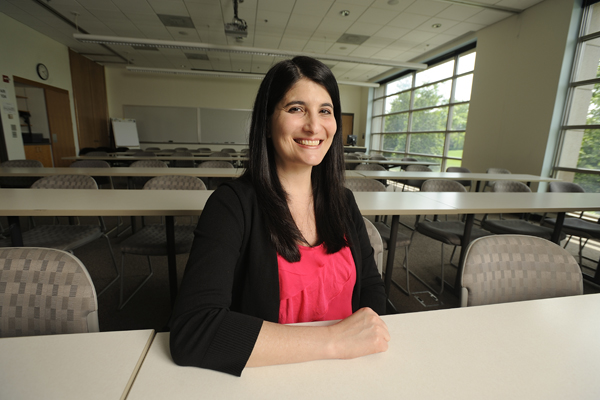
SCHOOL OF EDUCATION: Tamara Marder
Tamara Marder, program coordinator, Severe Disabilities and Autism Programs
How would you describe your teaching philosophy? My teaching philosophy is to focus on both theory and practice. When teaching, my class lectures include both the theory and principles of applied behavior analysis and the practical strategies that students can use every day. My goal for each student is that they will be able to take away a specific strategy from each class that they can apply the next day in their own classrooms.
What’s the best piece of teaching advice you ever received? Know your audience. I like to start the semester gathering information from the students, determining their current position in special education, previous experiences and future goals in the field. This allows me to tailor examples that I use in class to help them learn concepts. If they can hear examples that they can relate to, it will then help them to also apply the concepts every day.
Did you have any teaching inspirations? All of my previous experiences, from professors in graduate school to employment experiences—working in hospitals, schools and in homes with families—and my experiences teaching, have all inspired me. I am able to reflect upon these experiences and what I have learned throughout my career and from students’ experiences and apply that in lectures and discussions in class.
Best teaching/classroom moment of the past year? There was a student in my class who was having difficulty modifying previous perceptions regarding how to approach a specific student who was displaying challenging behaviors at school. This student [of mine] was diligent and always asked questions to learn how to apply the principles of behavior change and concepts we were learning during the semester. By the time [my] student handed in the final paper, an assessment and development of a behavior plan for the identified child, the student commented that the exercise in completing the final project helped to synthesize all that was learned during the semester. It was evident that this student worked hard to learn and apply the concepts. I felt confident, based on the student’s performance on the project and in the class, that this graduate student learned skills that would be used in the future to benefit other students.
What have you learned from your students? That although I may have many years of experience in a variety of settings as well as advanced degrees in the field, I can still learn something new every day.
SCHOOL OF MEDICINE
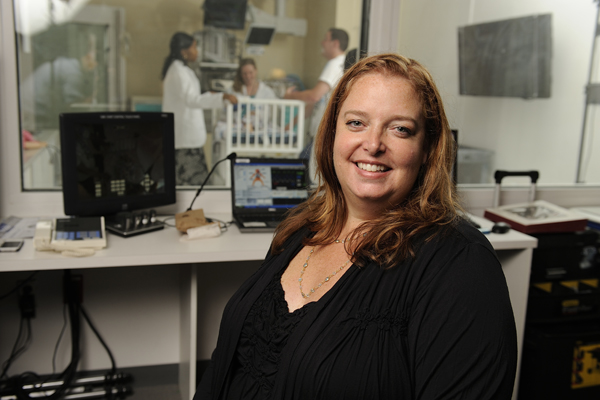
SCHOOL OF MEDICINE: Elizabeth Hunt
Elizabeth Hunt, associate professor, Pediatric Anesthesiology
How would you describe your teaching philosophy? The key thing I am interested in is moving beyond whether the students I am teaching “know” what I have just taught—i.e., can get a high score on a multiple choice question test—to having them “show” me that they truly know how to apply this knowledge as it relates to patient care. This means they know how to operationalize the knowledge. For example, they don’t just know when to defibrillate a patient in cardiac arrest, they show me in a simulated environment—on plastic manikins, before they will do this on a human patient—that they truly can defibrillate a patient.
What’s the best piece of teaching advice you ever received? Keep the educational environment “safe.” While I have very high standards and expect my students to master what I am teaching them, I want them to feel very comfortable asking questions, to have fun while they are learning, to have curiosity about what we are doing and why we are doing it and to understand that it is OK to “mess up” and make mistakes in the learning environment, but to do it again and again until they have mastered it by the time they are ready to apply that knowledge to a patient, or to know when and how to call for help in order to keep the patient safe.
Did you have any teaching inspirations? I feel very lucky to have had a number of teaching inspirations throughout the years, all of whom have had a similar theme of having very high standards but also having the teaching and mentoring skills to make sure the student could achieve them: Mrs. Crabtree in AP Biology at Paint Branch High School [in Burtonsville, Md.]; Dr. Mary Desmond during Comparative Vertebrate Anatomy at Villanova; Dr. Scharfman, who taught me physical exam skills at Albany Medical School; Dr. Ralph Corey, who was my program director at Duke University; and [Vice] Dean David Nichols, who was a mentor when I was a fellow in the Johns Hopkins PICU [pediatric intensive care unit].
Best teaching/classroom moment of the past year? It was actually with a group of pediatric residents, combined with interns and senior residents. They were in a monthly two-hour course I developed over the past 10 years that prepares them to respond to a cardiac arrest anytime their code beeper goes off, i.e., “just in time learning.” We have the residents in the simulation lab and give them case after case of a child who suddenly becomes critically ill and needs their help. The cases become progressively harder, and they do it again and again until they are truly ready to manage the “first five minutes” of an event until the whole code team gets there. In this case, many of the residents had been through the curriculum several times, and by the end of the two hours, the teams were working together like a NASCAR pit crew, and I actually started to cry—I just knew that they could save a baby’s life if they were called to do so. I have collected evidence over the past seven years about what the residents were not really able to do in the past, and we’ve now proved that this curriculum truly improves their skills, and it is exciting to know they are ready to save lives.
What have you learned from your students? Keep it fun. I hate to see them start to get bored, or to start checking their iPhones. It is my goal to keep that spark, to keep them engaged, with good eye contact, asking questions, and I just love it when you can see the light bulb go off and they suddenly get it and they start high-fiving each other.
School of Nursing
Laura Taylor, assistant professor, Nursing Systems and Outcomes, undergraduate teaching
How would you describe your teaching philosophy? Be engaging. Be creative. Be up-to-date. Be tough—but fair.
What’s the best piece of teaching advice you ever received? Enunciate when you speak. Don’t be afraid to admit that you don’t know the answer. And, finally, “You remind me of the Magic School Bus and Miss Frizzle!” Yowza, that is perfection.
Did you have any teaching inspirations? My father, James C. Adrian, is a full professor of dental histopathology. He still lectures. He always took his students on a journey—a theme for his presentations and semester—either through Europe, his children/family or Washington, D.C. I so enjoy taking current events and incorporating them into the content. “Look at Michael Phelps,” I’ll say. “Look at the hypertrophy of those chest muscles in order to swim the butterfly.” When students see that nursing is everything they do and see it brings education to life in their heads and their learning becomes who they are every day. It demands integration of content.
Best teaching/classroom moment of the past year? I really enjoy bringing my clone, “Gigi,” to class. She can rock it out on Rock Band. [Gigi] plays Truckin’ by Grateful Dead to emphasize the co-morbidity presentation of diabetes and cardiovascular disease. We had 25 students wearing tie-dye in Adult Health 1. And then there’s puppy therapy with students. When we do exam reviews, I bring my puppy. It is so relaxing, strengthens communication and is, let’s just say it, highly entertaining.
What have you learned from your students? That I have the best job in the world. They make me realize that I am in the best place in the world. They make me thankful.
Martha Sylvia, assistant professor, Nursing Systems and Outcomes, graduate teaching
How would you describe your teaching philosophy? For me, teaching is a lifelong process of learning. In my interactions with students, I hope to instill this same sense of curiosity and relentless pursuit of continued learning.
What’s the best piece of teaching advice you ever received? Take on challenges that seem beyond your reach. Diversify your teaching experiences.
Did you have any teaching inspirations? I have had many favorite and inspiring teachers along the way and continue to engage in new mentoring relationships. I also learn a great deal from those who are not in traditional teaching roles. I carry important “gems” from all of them into my teaching experiences.
Best teaching/classroom moment of the past year? My best experiences over the past year have been in developing and teaching the Clinical Data Management course for the DNP program. As part of that class, I run help sessions every week. My best experiences have been when a student starts the semester with a complete lack of confidence in applying data management and statistical knowledge to their own data sets and by the end of the semester they have independently completed an entire analysis and presented it with confidence.
What have you learned from your students? I’ve learned so much, but most importantly I’ve learned to be patient with each student’s individual learning trajectory. Every student is unique, with different needs for learning, but everyone is capable of learning.
Whiting School of Engineering
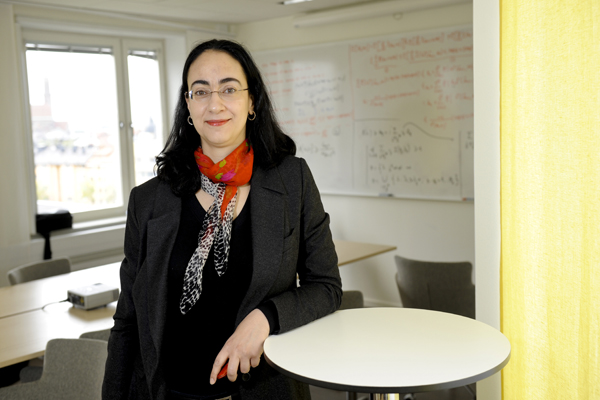
WHITING SCHOOL OF ENGINEERING: Danielle Tarraf
Danielle C. Tarraf, assistant professor, Department of Electrical and Computer Engineering
How would you describe your teaching philosophy? Obviously, it is very important to teach the students the course material. But it is even more important to train them to think analytically, and to train them to ask the right questions.
What’s the best piece of teaching advice you ever received? I don’t think I ever received teaching advice directly. I have learned by example, from observing all the great teachers I have been fortunate to have.
Did you have any teaching inspirations? I have been extremely lucky. I have had many wonderful teachers at various stages of my education, starting from middle and high school all the way through the doctoral program. I am greatly indebted to them for setting a high standard, and for positively influencing my education and career. I have observed several common traits among them: They all love the material they teach, and they all care deeply about their students.
Best teaching/classroom moment of the past year? It happens every semester: A student who starts out relatively weak gradually improves through the semester and goes on to earn one of the highest grades in the class. These instances give me a great sense of achievement.
What have you learned from your students? Their questions keep me on my toes. It’s great to revisit well-established concepts or results and view them through new eyes every semester.

